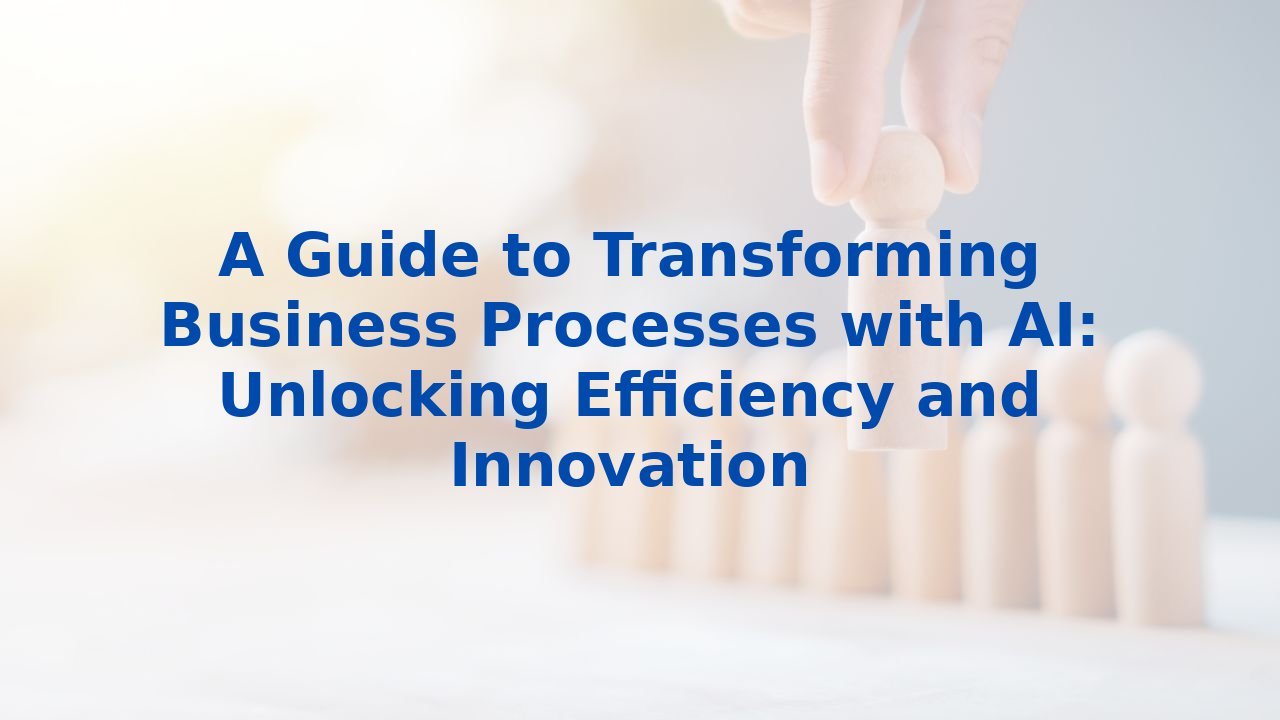A Guide to Transforming Business Processes with AI: Unlocking Efficiency and Innovation
A Guide to Transforming Business Processes with AI: Unlocking Efficiency and Innovation
In a business landscape that continually shifts under the pressures of innovation and competition, organizations are on a relentless quest for improvement. Enter Artificial Intelligence (AI), a transformative force capable of redefining traditional business processes. This guide delves into not just the mechanisms of AI, but the opportunities it presents for enhancing efficiency and cultivating innovation within your enterprise.
1. Understanding Business Processes
At its core, a business process represents a series of structured activities or tasks designed to produce a specific output for a particular customer or market. These processes encompass everything from product returns to onboarding new employees. Their efficiency dictates an organization's ability to respond to customer needs and their agility in seizing market opportunities.
2. Process Discovery and Mapping
The journey begins with process discovery, where AI's analytical power shines. Tools such as process mining and natural language processing dissect existing workflows, illuminating inefficiencies and bottlenecks that may elude human eyes. This analysis offers a panoramic view of operations, allowing management to focus on optimizing processes rather than being bogged down by minutiae. The outcome? A more streamlined, agile operating model ready to adapt to change.
3. Process Automation
AI is poised as the catalyst for profound process automation. Gone are the days when repetitive tasks consumed valuable human resources. Robotic Process Automation (RPA) takes over these duties, operating around the clock with unmatched accuracy. Importantly, automation frees employees to redirect their efforts from mundane tasks into strategic initiatives that drive innovation and growth.
4. Process Management and Improvement
Once processes are automated, AI doesn’t just sit back and relax. It actively monitors operations and utilizes historical data to provide real-time insights. This proactive management approach alerts teams to potential issues before they become crises, ensuring that operations remain smooth and efficient. By leveraging data-driven insights and predictive modeling, businesses can foster a culture of continuous improvement, adapting dynamically to internal and external challenges.
5. Predictive Analytics: The Crystal Ball
One of the standout capabilities of AI is its knack for predictive analytics. By analyzing extensive datasets at lightning speeds, AI forecasts demand patterns, optimizes resource allocation, and aids in inventory management. This foresight is invaluable; organizations can meet market demands head-on, adjusting their strategies based on actionable data insights before changes occur.
6. Enhancing Customer Experience
Today's consumers crave personalized interactions, and AI is the key to unlocking this imperative. By examining customer behavior and preferences, AI tailors experiences that resonate on a deeper level. A matched product suggestion or a tailored marketing message enhances customer satisfaction and loyalty—two vital ingredients in the formula for business success.
7. Error Reduction and Compliance Assurance
Human error can be costly, but AI systems significantly minimize its occurrence. By automating data entry and compliance checks, organizations benefit from greater precision, especially in sensitive fields like finance and healthcare. AI not only ensures adherence to industry standards but also acts as an ever-watchful safeguard against potential penalties, helping build a more resilient organization.
8. Optimizing the Supply Chain
The supply chain, often seen as the backbone of any organization, benefits immensely from AI. By analyzing both historical and real-time data, AI can predict fluctuations, optimize inventory levels, and propose efficient logistics routes. This results in a more adaptable and responsive supply chain that minimizes costs and enhances service delivery.
The Importance of Employee Training on AI
While AI provides the tools for transformation, the true transformation lies in your people. Training your workforce to leverage AI brings forth a myriad of benefits:
- Enhanced Collaboration: Employees equipped with AI knowledge can blend their expertise with technological capabilities, yielding superior decision-making.
- Adaptability: Keeping pace with AI advancements ensures that your employees remain agile in an ever-evolving business landscape.
- Improved Decision-Making: Well-trained employees can harness AI’s data insights, leading to informed and strategic choices.
- Reduced Resistance: Training fosters a culture of acceptance towards new technologies, making transitions smoother and less disruptive.
Conclusion
AI's integration into business processes is more than a trend; it's a powerful shift in how organizations operate and innovate. From automating tasks to providing vital insights and enhancing customer engagement, AI unlocks phenomenal potentials for efficiency and growth. However, the magic truly happens when businesses invest in training their employees to work hand-in-hand with these technologies, creating a synergy that drives sustainable success. Embrace AI and transform not only your processes but also the very fabric of your organization.



